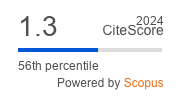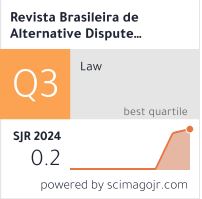A evolução da arbitragem esportiva
a passagem das provas em papel para as provas digitais nas disputas no futebol
Palavras-chave:
Arbitragem esportiva, Provas digitais, Jurisprudência, Provas hackeadas e vazadas, Notas PráticasResumo
A digitalização apresenta muitos desafios para o direito esportivo, incluindo questões relacionadas ao uso de provas digitais nas disputas arbitrais. Como um dos esportes mais populares, o futebol gera muitas controvérsias esportivas. As partes cada vez mais utilizam provas digitais para sustentar suas posições, o que exige uma avaliação minuciosa e profissional por parte dos árbitros. O objetivo deste artigo é explorar os desafios que as provas digitais representam no esporte, com foco específico no futebol. A pesquisa concentra-se principalmente na admissibilidade das provas digitais e nas provas hackeadas e vazadas, dado o risco de violações de dados sensíveis do futebol. A aplicação da análise jurídica comparativa e do estudo de caso, através da análise da literatura existente, dos frameworks legais e da jurisprudência, permitiu examinar uma gama de provas digitais utilizadas pelos litigantes e demonstrar os padrões de admissibilidade adotados pelos tribunais arbitrais. Como uma implicação prescritiva, os autores propuseram orientações práticas para partes interessadas e adjudicadores sobre como gerenciar e avaliar provas digitais na arbitragem esportiva.
Referências
Ferreira, D. B., & Gromova, E. A. (2023). Electronic evidence in arbitration proceedings: empirical analysis and recommendations. Digital Evidence & Elec. Signature L. Rev., 20, 30. https://doi.org/10.14296/deeslr.v20i.5608.
Ferreira, D. B., Giovannini, C., Gromova, E., & da Rocha Schmidt, G. (2022). Arbitration chambers and trust in technology provider: Impacts of trust in technology intermediated dispute resolution proceedings. Technology in Society, 68, 101872. https://doi.org/10.1016/j.techsoc.2022.101872.
Ferreira, D. B., Giovannini, C., Gromova, E. A., & Ferreira, J. B. (2023). Arbitration chambers and technology: witness tampering and perceived effectiveness in videoconferenced dispute resolution proceedings. International Journal of Law and Information Technology, 31(1), 75-90. https://doi.org/10.1093/ijlit/eaad012.
Ferreira, D. B., & Gromova, E. A. (2023). Digital Evidence: The Admissibility of Leaked and Hacked Evidence in Arbitration Proceedings. International Journal for the Semiotics of Law-Revue internationale de Sémiotique juridique, 37, 903-922. https://doi.org/10.1007/s11196-023-10014-1.
Ferreira, D. B., & Gromova, E. A. (2024). Digital Evidence in Disputes Involving States, 118, 51-56. https://doi.org/10.1017/aju.2024.4.
Freeman, L. (2020). Hacked and Leaked: Legal Issues Arising from the Use of Unlawfully Obtained Digital Evidence in International Criminal Cases. UCLA J. Int’l L. Foreign Aff., 25, 45. https://escholarship.org/content/qt5b87861x/qt5b87861x.pdf.
Furnell, S. M., & Warren, M. J. (1999). Computer hacking and cyber terrorism: The real threats in the new millennium? Computers & Security, 18(1), 28-34. https://doi.org/10.1016/S0167-4048(99)80006-6.
Jonson, P., & Hoye, R. (2011). Sport law and regulation. Sport Management Review, 14(3), 223–225. https://doi.org/10.1016/j.smr.2011.08.003.
Kessler, Gary C. (2011) Judges’ Awareness, Understanding, and Application of Digital Evidence, Journal of Digital Forensics, Security and Law. 6, 1, 55-72. https://doi.org/10.15394/jdfsl.2011.1088.
Li, Z., Zheng, P., & Xie, H. (2024). Judicial digital intellectualization and corporate online misconduct. Finance Research Letters, 62, 105117. https://doi.org/10.1016/j.frl.2024.105117.
Mason, S., & Seng, D. (2021). Electronic Evidence and Electronic Signatures (p. 604). University of London Press. https://ials.sas.ac.uk/publications/electronic-evidence-and-electronic-signatures.
Patrikios, A. (2008). The role of transnational online arbitration in regulating cross border e-business – Part I. Computer Law & Security Review, 24(1), 66–76. https://doi.org/10.1016/j.clsr.2007.11.005.
Palanissamy, A., & Kesavamoorthy, R. (2019). Automated Dispute Resolution System (ADRS) – a proposed initial framework for digital justice in online consumer transactions in India. Procedia Computer Science, 165, 224–231. https://doi.org/10.1016/j.procs.2020.01.087.
Reedy, P. (2023). Interpol review of digital evidence for 2019–2022. Forensic Science International Synergy, 6, 100313. https://doi.org/10.1016/j.fsisyn.2022.100313.
Worster, W. T. The Effect of Leaked Information on the Rules of International Law (2013). American University International Law Review, 28, 443-464.
Zhang, J. K., Alimadadi, A., ReVeal, M., Del Valle, A. J., Patel, M., O’Malley, D. S., Mercier, P., & Mattei, T. A. (2023). Litigation involving sports-related spinal injuries: a comprehensive review of reported legal claims in the United States in the past 70 years. The Spine Journal, 23(1), 72–84. https://doi.org/10.1016/j.spinee.2022.08.012.
Downloads
Publicado
Edição
Seção
Licença
Copyright (c) 2024 REVISTA BRASILEIRA DE ALTERNATIVE DISPUTE RESOLUTION

Este trabalho está licenciado sob uma licença Creative Commons Attribution 4.0 International License.
Não serão devidos direitos autorais ou qualquer outra remuneração pela publicação dos trabalhos.
As opiniões emitidas pelos autores dos artigos e resenhas são de sua exclusiva responsabilidade.







